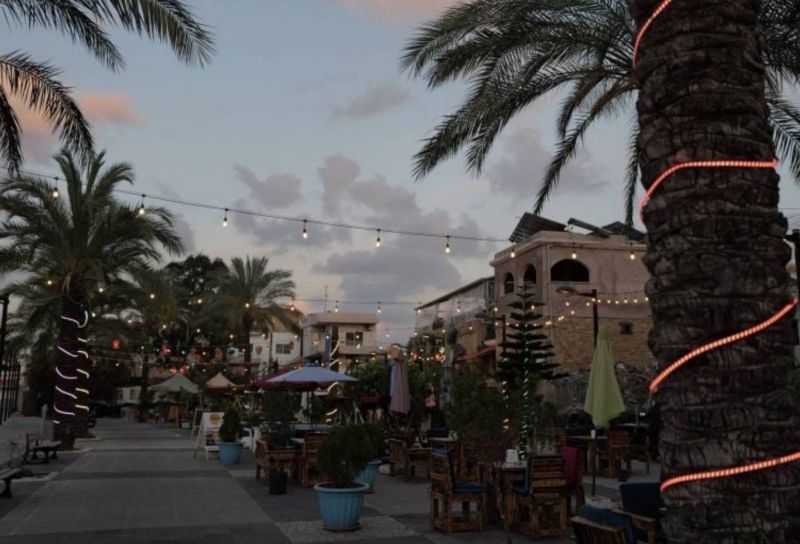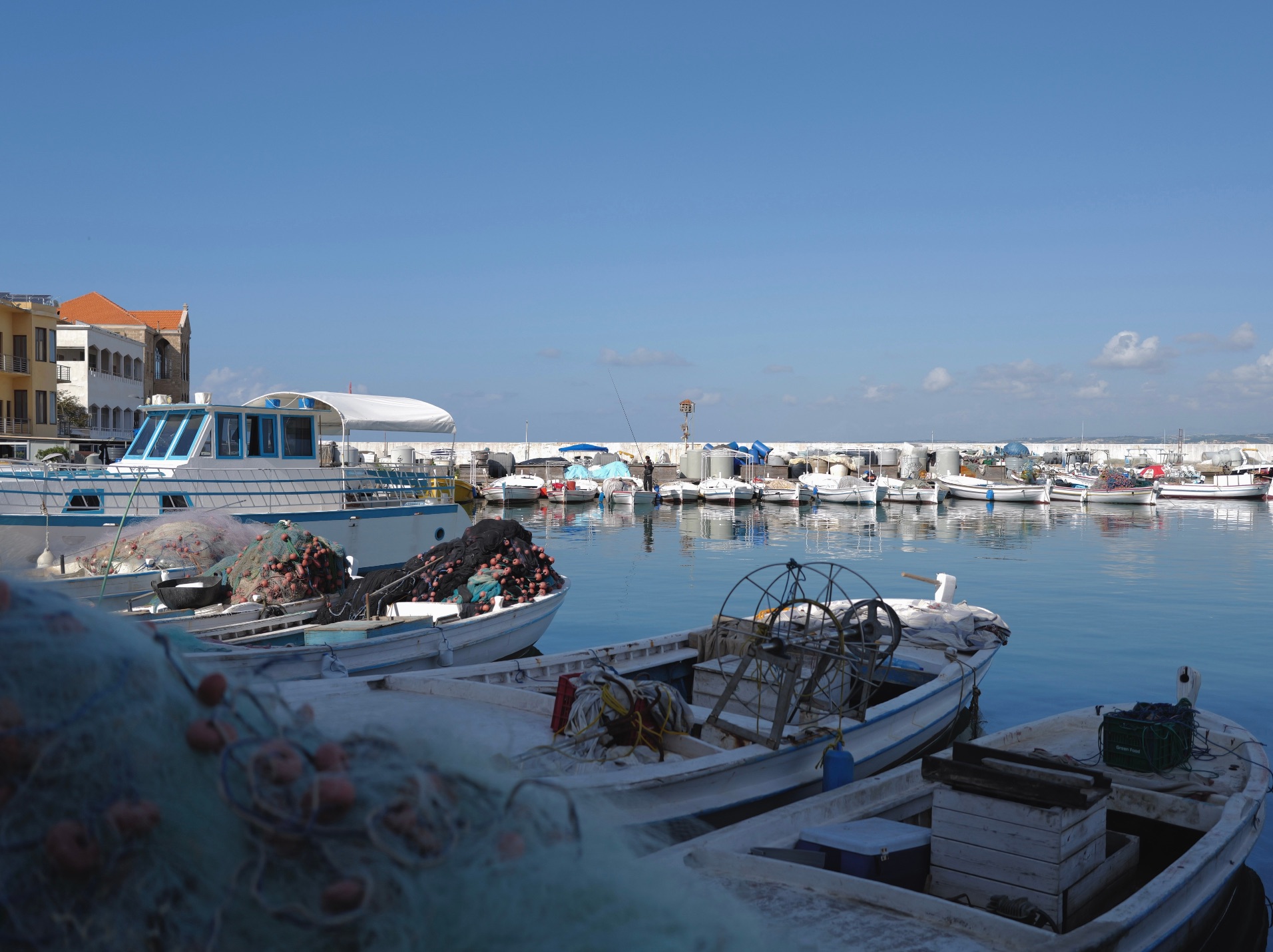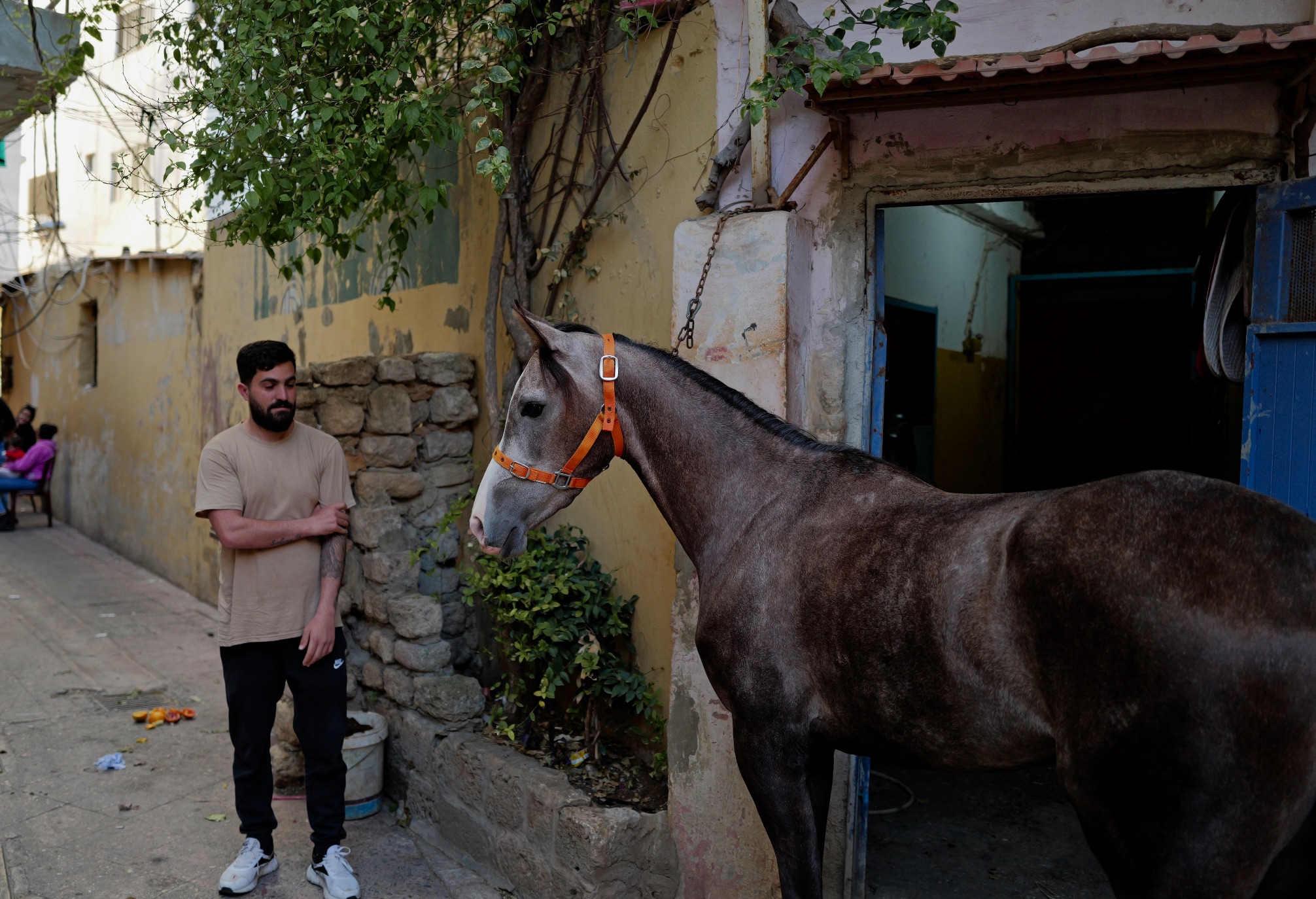
The square in front of the port of Tyre. Thursday March 14. (Credit: Matthieu Karam/L'Orient Today)
Dr. Jaber scans through the Al-Akhbar newspaper while smoking a cigar at a cafe terrace on Hamra Street. He follows the news in each of the four Arabic-language newspapers he buys every morning. Today, he sits convinced that Lebanon is not threatened by a wider war.
However, the possibility of a large-scale Israeli offense on the country seems to have increased in recent weeks.
More than 90,000 south Lebanon residents have been displaced since Oct. 7. The fighting has gone on for nearly six months now, and Israel has since carried out several unprecedented strikes in the last two weeks, in the Bekaa Valley and Sour. Though it seems Lebanon is experiencing the worst after Hamas’ Oct.7 attack, fears seem to have dissipated among the population and lives have mostly returned to normal.
Is it denial or fatalism? One thing is certain: most Lebanese live as if the war has nothing to do with them. That is true particularly since Hezbollah seems to be containing the escalation, retaliating to Israeli attacks, albeit with restraint.
 The fishing port of Tyre. March 14, 2024. (Credit: Matthieu Karam/L'Orient-Le Jour)
The fishing port of Tyre. March 14, 2024. (Credit: Matthieu Karam/L'Orient-Le Jour)
In a speech on Wednesday marking the start of Ramadan, Hezbollah’s Secretary General Hassan Nasrallah claimed that the party is the only thing preventing Israel from launching a full-scale war on Lebanon. “Whoever wants to assess what the resistance is doing at the Lebanese front needs to look into what is dissuading the enemy from launching a war against Lebanon,” Nasrallah stated.
Regardless, members of the US administration and intelligence services fear that Israel could launch a ground operation in Lebanon in late spring or early summer if diplomatic efforts do not succeed.
Last Friday in Beirut the atmosphere seemed unchanged, although, for Ramadan, the streets were emptier than usual.
“Israel and Hezbollah are puffing their chests. It’s all talk, nothing will happen,” says Ali, 56, a former Army soldier who runs a fruit juice stall with his son.
Zeina, a radiology technician, was having a cigarette break. She says she doesn’t believe “ this is a repeat of the 2006 war.”
“If they had wanted to, they would have started it already. They just want to play with our nerves,” she says, without mentioning Israel. “I live in Awkar, right next to the US embassy, and I work at the AUBMC, so I feel pretty safe,” she says.
“In the first few weeks, I really felt that we were heading for war. But the longer this drags on, the more I get the feeling that the danger has receded and that only limited strikes will occur,” says Lana, a 34-year-old expert in instructional design.
Around the American University of Beirut, students wait for cabs. Speaking to L’Orient-Le Jour, several seemed unfazed by what has been happening in south Lebanon, despite it being only a few dozen kilometers away.
“Ever since we were kids, our parents have been raising the specter of war. We’re used to it, so we don’t feel anything more than usual, and they don’t seem worried,” says Jad*, a finance student.
Deceptive appearances
On Thursday, some 80 km away in the city of Sour, the first signs of spring were visible. The sun illuminated the pier and Ramadan decorations adorned the city center. Residents went about their business in a strange atmosphere of serenity and calm.
But appearances are deceptive. Beneath the veneer of normalcy, nerves were being sorely tested. North of the city, the hum of a drone, invisible to the naked eye, was a reminder that the threat is never far away.
The day before, on Wednesday, an Israeli drone fired at a car along the road between Sour and al-Haouch. It targeted a Hamas member, who was killed in the strike along with two civilians who were passing by.
Bassem, a man we met at the old port, narrowly escaped the strike. The drone video released by the Israeli army following the attack shows Bassem’s car. He was driving just behind the target. “Of course I’m scared. We are already in a war situation, but since this episode, I am convinced that we are approaching a full-scale war,” Bassem said.
Next to him, Salim*, a 65-year-old fisherman, was hanging up his nets. “Will there be a war in all of Lebanon? Because it was Lebanon that went to war? If you raise the subject, you get slapped in the face,” he said.
Salim doesn’t believe the Israelis will invade the area. He feels they will content themselves with targeted operations like the one that happened outside Sour on Wednesday. “I’m not a keen political analyst, but I don’t think it’s in their interests, or in Hezbollah’s,” says the fisherman.
In one of the narrow streets of the old souk, a young man named Rawad was tending to his horse, Amara. “We live amid ongoing tension, and after the last incident that took place four kilometers away, we feel that things are getting closer,” says the 24-year-old horse breeder.
 Rawad, from Sour, does not believe that all-out war is imminent. (Credit: Matthieu Karam/L'Orient-Le Jour)
Rawad, from Sour, does not believe that all-out war is imminent. (Credit: Matthieu Karam/L'Orient-Le Jour)
He is reassured, however, by the insistence of his father and other old family members who said they are “80 percent” sure Lebanon would be spared.
A little further on, in Sour’s Christian quarter, Janette and her daughter Maria share a hookah in front of their building. Usually, at this time of year, the family rents out rooms to tourists. Today, visitors are scarce, and their last customers canceled their weekend reservations after Wednesday’s attack.
On the ground floor, two displaced sisters from Dhairah, a border village heavily affected by the bombardment, now share a room they reserved for the month. This has all led Janette to believe that war is imminent. “Everyone around says so,” she says.
Mohammad*, a farmer from Beit Lif and father of eleven children, is struggling to be patient. He smokes nervously in the classroom that has been accommodating his family for months, at a school where dozens of displaced families have been sheltered. “The war is going to get wider, and the next few days will be decisive,” he says. In the courtyard, a woman from Beit Lif walks with her disabled daughter. She wears the keys to her house around her neck.
This article was originally published in French in L'Orient-Le Jour. Translation by Joelle El Khoury.
